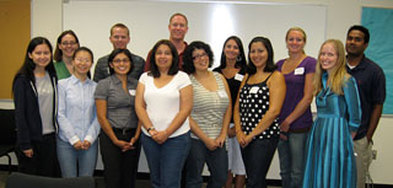Newsletter - Fall 2008
 Greg Duncan Ph.D.
Greg Duncan Ph.D.
Department of Education Welcomes Greg Duncan and George Farkas
Distinguished Professor Greg Duncan comes to the University of California, Irvine from Northwestern University, where he served as the Edwina S. Tarry Professor in the School of Education and Social Policy and Faculty Affiliate in the Institute for Policy Research. He has published extensively on issues of income distribution, child poverty and welfare dependence.
Dr. Duncan is a member of the interdisciplinary MacArthur Network on the Family and the Economy. He was elected to the American Academy of Arts and Sciences in 2001 and president of the Population Association of America for 2007-08. He was elected president of the Society for Research in Child Development for 2009-2011.
Distinguished Professor Greg Duncan comes to the University of California, Irvine from Northwestern University, where he served as the Edwina S. Tarry Professor in the School of Education and Social Policy and Faculty Affiliate in the Institute for Policy Research. He has published extensively on issues of income distribution, child poverty and welfare dependence.
Dr. Duncan is a member of the interdisciplinary MacArthur Network on the Family and the Economy. He was elected to the American Academy of Arts and Sciences in 2001 and president of the Population Association of America for 2007-08. He was elected president of the Society for Research in Child Development for 2009-2011.
 George Farkas Ph.D.
George Farkas Ph.D.
Professor George Farkas’ research has made a major contribution to understanding the school achievement gap for low-income and ethnic minority students. He has employed a range of statistical approaches and databases to examine the causes and consequences of this gap across varying age groups and educational settings, and was one of the first to show that the gap emerges in early childhood. Dr. Farkas has studied the life cycle earnings consequences of cognitive skill and behavioral differences between individuals, and has done research on gender differences. He has a particular interest in quasi-experimental statistical methodology.
Professor Farkas was elected to the Sociological Research Association in 1996, and was recently elected to the organization’s executive committee. He will serve as President in 2010.
Professor Farkas was elected to the Sociological Research Association in 1996, and was recently elected to the organization’s executive committee. He will serve as President in 2010.
 Deborah Vandell, Ph.D.
Deborah Vandell, Ph.D.
Chair Vandell Delivers 2008 State of the Department Address
Department Chair Deborah Lowe Vandell delivered the 2008 State of the Department Address on Friday, September 19, 2008, in Berkeley Place 1111. Dr. Vandell began the address by reading the Department Mission Statement:
Highlights from the address included the following:
Department Chair Deborah Lowe Vandell delivered the 2008 State of the Department Address on Friday, September 19, 2008, in Berkeley Place 1111. Dr. Vandell began the address by reading the Department Mission Statement:
- The Department of Education seeks to promote educational success and achievement of ethnically and economically diverse learners of all ages through our collective research, teaching, and service activities that foster learning and development in and out of school.
Highlights from the address included the following:
- During the past year, DoE has met all of the department goals that were established for 2007-2008.
- As of June 30, 2008, DoE grants have surpassed $10,000,000. The resulting average of $529,000 per faculty member positions DoE in per capita funding second only to the Medical School within UCI and to UCLA among major universities.
- This past year the number of DoE Senate Faculty has increased to 22 with the addition of three senior faculty members: Distinguished Professor Greg Duncan; Professor George Farkas, and Professor Scott Paris.
- Researcher and lecturer Claudia Pineda has joined DoE as a career partner.
- Senate Faculty assuming leadership positions include: Professor Greg Duncan, President of the Population Association of America and President Elect of the Society for Research in Child Development (SRCD); Professor George Farkas, Member of the Executive Committee of the Sociological Research Association, due to become President in 2010; Professor Margaret Burchinal, Associate Editor of the Journal of Child Development; Professor Michael E. Martinez, Elected to Executive Committee of Division 15, Educational Psychology Association; and Associate Professor Joseph Mahoney, serving on the SRCD Governing Council on Policy and Communication.
- Senate faculty member Penny Collins was promoted to the rank of Associate Professor with tenure.
- Six DoE lecturers were promoted to Continuing Lecturer status: Valerie Henry, Jeff Johnston, Jacqueline D’Warte, Brad Hughes, Susan Guilfoyle, and Brad Van Patten.
- Three visiting scholars are conducting research in the Department: Senior Lecturer Penny Burke from England, Fulbright Scholar Meei Ling Liaw from Taiwan, and Professor Takashi Kato from Japan.
- DoE’s two Ed.D. programs graduated 17 Doctors of Education this past year.
- DoE’s Ph.D. in Education Program has admitted a second cohort of 14 students.
- The Master of Arts in Teaching, Credential, and Intern programs have increased enrollment 10% over 2007 enrollment.
- DoE’s Undergraduate Minor in Educational Studies delivered 12,000 undergraduate credit hours during 2007-2008, making the UMES the second most popular minor on the UCI campus, following the School of Management minor.
- DoE’s participation in UCI Cal TEACH, in partnership with Biological Science, Physical Sciences, and Information and Computer Sciences (ICS), is increasing enrollment in programs preparing teachers of Science and Mathematics. UC Irvine was one of ten higher education institutions nationwide selected by Exxon Mobile Foundation to implement the TEACH project.
- The UCI Writing Project, in addition to continuing work on their Institute of Educational Sciences grant, achieved its highest participation in its 31-year history of delivering summer and academic year programs for teachers and youth.
- DoE square footage has increased from 23,000 to 30,000.
- 2008-2009 will be a year of continued growth with expansion of faculty, course offerings, and student enrollment.
Department of Education Establishes Leadership Council
The Department of Education’s Leadership Council is bringing together community members from business, government, education, and the civic sector to share perspectives and experiences on some of the issues impacting K-20 education in Southern California. Twice a year members are meeting at UC Irvine to consider research, education, and practice in a given topic area. The Fall 2008 topic, After School Programs, featured presentations by Associate Professor Joseph Mahoney, Lecturer Jeff Johnston, THINK Together Founder and CEO Randy Barth, and Tiger Woods Learning Center Executive Director Katherine Bihr. The Spring 2009 topic will address Early Childhood and Pre-school Education.
The Leadership Council was established in Spring 2008 with the following goals:
The Department of Education’s Leadership Council is bringing together community members from business, government, education, and the civic sector to share perspectives and experiences on some of the issues impacting K-20 education in Southern California. Twice a year members are meeting at UC Irvine to consider research, education, and practice in a given topic area. The Fall 2008 topic, After School Programs, featured presentations by Associate Professor Joseph Mahoney, Lecturer Jeff Johnston, THINK Together Founder and CEO Randy Barth, and Tiger Woods Learning Center Executive Director Katherine Bihr. The Spring 2009 topic will address Early Childhood and Pre-school Education.
The Leadership Council was established in Spring 2008 with the following goals:
- The mission of the Leadership Council is to promote reflection and exchange between the Department of Education and representatives from the community on the activities, role, and future direction of the department. Leadership Council members advise on opportunities for community engagement and service, participate in scholarly presentations delivered by faculty members, and comment upon the goals and accomplishments of the department. Leadership Council members support the department in its three-fold mission of research, teaching, and service and are encouraged to liaise with the community at large on behalf of the department.
DoE Developing Undergraduate Certificate in After-School Education
The Department of Education is developing an undergraduate Certificate in After-school Education, which will be the first such program in the United States. Course work for the certificate will build on a growing body of research about the positive outcomes for children and youth who participate in high quality after-school programs on a regular basis. Rationale for the Certificate grew from recognition that there is a critical need for quality curriculum and well-trained after-school program personnel in order to achieve positive outcomes in after-school settings that provide educational enrichment and academic support outside of the formal school day setting.
Program goals for the Certificate include the following:
A minimum of five courses totaling 20 quarter units are required for completion of the Certificate, along with a minimum 70 hours of field experience. Two required courses provide a theoretical grounding and foundational knowledge regarding historical and current issues and policy in after-school education, program curriculum, predictors for desired outcomes, and relevant issues in child and adolescent development. Students select three remaining courses that focus on teaching, learning, and academic enrichment in particular subject areas, and provide UCI students with opportunities to design, implement, and evaluate high quality program activities for children and adolescents in regional after-school programs.
The Department of Education is partnering with selected after-school program providers to offer undergraduates practical field experience at sites that address a variety of after-school program skill sets (e.g., literacy, technology, arts, math/science, sports and physical education), and that serve children and youth who are racially/ethnically diverse, economically disadvantaged, and in need in academic assistance. The following organizations or schools have partnered with DOE to offer fieldwork placements for UCI students: Wilson Elementary School, College Park Elementary, Turtle Rock Community Park, Think Together, OCTAC: Orange County Children’s Therapeutic Arts Center, OCEAA: Orange County Educational Arts Academy, and Pio Pico Elementary School.
The primary audience for this certificate program will be UCI undergraduates who are interested in serving children and youth in after-school program settings and in developing their abilities to assess and contribute to the quality of those programs. The Certificate program has been designed to complement the existing Minor in Educational Studies offered by the Department of Education. While undergraduates can earn a Certificate in After-school Education without earning a minor in Educational Studies, those who do complete the certificate can easily complete the minor requirements by completing just two additional courses from the minor’s “core course” category. The Department of Education also is collaborating with UCI Extension and its ACCESS UCI program to advertise and make the courses for the Certificate in After-school Education available to active or prospective after-school program personnel who are not enrolled in UCI degree programs.
The Department of Education is developing an undergraduate Certificate in After-school Education, which will be the first such program in the United States. Course work for the certificate will build on a growing body of research about the positive outcomes for children and youth who participate in high quality after-school programs on a regular basis. Rationale for the Certificate grew from recognition that there is a critical need for quality curriculum and well-trained after-school program personnel in order to achieve positive outcomes in after-school settings that provide educational enrichment and academic support outside of the formal school day setting.
Program goals for the Certificate include the following:
- Provide UCI undergraduates with foundational knowledge about historical perspectives and policy initiatives in after-school education, as well as current research that identifies the predictors for positive participant outcomes in after-school programs;
- Develop in UCI undergraduates an understanding of child and adolescent development and the need to match after-school experiences with the interests, needs, and developmental level of program participants;
- Expose UCI undergraduates to different after-school program models, and develop their practical knowledge about program evaluation so that they can critically assess program strengths and weaknesses;
- Provide UCI undergraduates with comprehensive fieldwork experiences where they develop their abilities to design and implement high quality after-school program activities for children and adolescents in the programs that they serve; and
- Build UCI undergraduates’ awareness of how this certificate program provides a foundation for career options in after-school education, K-12 teaching, or other education-related careers, as well as graduate study opportunities.
A minimum of five courses totaling 20 quarter units are required for completion of the Certificate, along with a minimum 70 hours of field experience. Two required courses provide a theoretical grounding and foundational knowledge regarding historical and current issues and policy in after-school education, program curriculum, predictors for desired outcomes, and relevant issues in child and adolescent development. Students select three remaining courses that focus on teaching, learning, and academic enrichment in particular subject areas, and provide UCI students with opportunities to design, implement, and evaluate high quality program activities for children and adolescents in regional after-school programs.
The Department of Education is partnering with selected after-school program providers to offer undergraduates practical field experience at sites that address a variety of after-school program skill sets (e.g., literacy, technology, arts, math/science, sports and physical education), and that serve children and youth who are racially/ethnically diverse, economically disadvantaged, and in need in academic assistance. The following organizations or schools have partnered with DOE to offer fieldwork placements for UCI students: Wilson Elementary School, College Park Elementary, Turtle Rock Community Park, Think Together, OCTAC: Orange County Children’s Therapeutic Arts Center, OCEAA: Orange County Educational Arts Academy, and Pio Pico Elementary School.
The primary audience for this certificate program will be UCI undergraduates who are interested in serving children and youth in after-school program settings and in developing their abilities to assess and contribute to the quality of those programs. The Certificate program has been designed to complement the existing Minor in Educational Studies offered by the Department of Education. While undergraduates can earn a Certificate in After-school Education without earning a minor in Educational Studies, those who do complete the certificate can easily complete the minor requirements by completing just two additional courses from the minor’s “core course” category. The Department of Education also is collaborating with UCI Extension and its ACCESS UCI program to advertise and make the courses for the Certificate in After-school Education available to active or prospective after-school program personnel who are not enrolled in UCI degree programs.
DoE Reaches $10M in Funded Research New Grants
|
Learning for the 21st Century, Sponsored by St. Margaret's Episcopal School.
P.I: Professor Mark Warschauer The goal of this project is to provide formative and summative feedback to St. Margaret’s Episcopal School as it carries out its goal of helping students to develop the understanding and learning skills that will allow the students to become important scientific, business, and civic leaders in the 21st century. -------------------------------------------------------------------- One Laptop Per Mexican Child, sponsored by University of California Institute for Mexico and the United States. P.I.: Professor Mark Warschauer This study is examining the Mexican initiative that is making extensive use of XO laptops and other new technologies in an after school educational program. The study will provide a better understanding of the pertinence of one computer per student programs in promoting literacy and educational equity in Mexico. |
|
K-16 Partnerships for Higher Education Diversity and High School Reform, sponsored by UCI Council on Research, Computing and Library Resources
PI: Assistant Professor Thad Domina Thad Domina, Ph.D.After the elimination of affirmative action in 1997, the University of California pursued an aggressive college outreach strategy. UC's outreach programs -- which include intersegmental partnerships linking university leaders with leaders in high-poverty school districts, professional development programs for teachers in targeted high schools, and several programs that provide academic services and college information to at-risk students -- attempt to maintain campus diversity by enlarging the admissible black and Hispanic applicants from the state's public schools. By pairing program participation data with school- and district-level data, this research will evaluate the effectiveness of these diverse outreach programs. A time-series regression approach will be employed to measure the effects that UC's various college outreach programs have had on California's public high schools. -------------------------------------------------------------------- Shockwaves: Tracing the Effects of Affirmative Action Bans Through the High School to College Transition, sponsored by AERA Grants Program Assistant Professor Thurston Domina has been awarded an AERA research grant from the AERA Grants Program. The Program is sponsored jointly by the National Science Foundation and the National Center for Education Statistics. Dr. Domina, whose teaching and research focus on the role that educational policies play in producing and mitigating social inequalities, will be studying the effects of affirmative action bans through high school to college transition. Other research by Dr. Domina has investigated the intergenerational consequences of college access programs and the ways in which higher education admissions and financial aid policies can operate as high school reform programs. Abstract: In the late 1990s, a wave of voter initiatives, judicial decisions, and legislative policies prohibiting the consideration of race in higher education recruiting, admissions, and financial aid swept across several of the nation’s largest and most diverse states. By 2000, California, Texas, Washington, and Florida had banned affirmative action. The proposed project uses data from the National Education Longitudinal Study of 1988 (NELS) and the Education Longitudinal Study of 2002 (ELS) to generate difference-in-difference estimates of the effects that affirmative action bans had on the pipeline between high school and college. Earlier research focuses primarily on the direct compensatory effects that affirmative action policies have on student college admissions odds. I hypothesize that affirmative action bans have broader informational and motivational effects, and therefore expect affirmative action bans to have effects on the odds that black and Hispanic students apply to selective university and develop early college expectations. |
 George Farkas, Ph.D.
George Farkas, Ph.D.
George Farkas Presents at the University of Texas Population Research Center
George Farkas, Ph.D.Professor George Farkas presented findings from his research during an October 8 colloquium entitled “Early Inequality.” Referencing his analysis of data from ECLS-K (Early Childhood Longitudinal Program, Kindergarten Cohort): ECLS-B (Birth Program); NAEP (National Assessment of Educational Progress) and NLSY79 (National Longitudinal Survey Year 1979) , Professor Farkas provided statistical support for the following findings:
George Farkas, Ph.D.Professor George Farkas presented findings from his research during an October 8 colloquium entitled “Early Inequality.” Referencing his analysis of data from ECLS-K (Early Childhood Longitudinal Program, Kindergarten Cohort): ECLS-B (Birth Program); NAEP (National Assessment of Educational Progress) and NLSY79 (National Longitudinal Survey Year 1979) , Professor Farkas provided statistical support for the following findings:
- Children from different race/ethnic groups are being raised in families of enormously different social class backgrounds and experience different numbers of positive parenting activities, such as music lessons, organized sports, educational trips, parental involvement with school, number of children’s books in the home, computer access, and absence of harsh discipline
- Very different family backgrounds lead to large gaps in cognitive performance and learning related behaviors; these gaps begin at very young ages and are important for later outcomes.
- Among the risk factors that children may experience are poverty, welfare, teenage mother, depressed mother, absence of two married biological parents, English Language Learning, low birth weight, more than two siblings, and parental health problems.
- When SES is classified against race/ethnicity, and the percent of children with a high level of risk factors in each cell is computed, the great inequality in family environments is revealed.
- The effects of SES and race/ethnicity at 24 months seem to be stronger for children from multiple births.
- There are effects for problems with learning-related behaviors at 24 months for males and low SES, but not so much for race/ethnicity.
- Analysis revealed that children experiencing early inequality also attended very highly segregated schools, which were very strongly segregated by SES.
- Research conduced with Kurt Beron (2004) studied children in the NLSY79 to show PPVT (vocabulary) test scores from 36 months to 13 years of age, by race, regression adjusted for SES, and other variables; a Black-White gap was identified at 36 months that persisted through to age 13.
- Although recent research found progress in the area of strong math gains narrowing the achievement gap among Black and Hispanic students whose parents had a college education, Dr. Farkas opined that there is a long way to go to narrow achievement gaps.

DoE Welcomes 14 Ph.D. Students to Cohort 2
Fourteen new doctoral students have joined the department as members of Cohort 2. They arrive from across the continental United States, Hawaii, Canada, and the People’s Republic of China.
Members of the new cohort are entering doctoral work from the fields of educational psychology, law, state government, early intervention, recreation, policy, advocacy, research, and K-20 education. Their lived experiences include Norway, India, Korea, Fiji, Kenya, England, and the People’s Republic.
Degree granting institutions for master’s level work include Stanford; Boston University; Harvard; University of Washington; University of Houston; Sichuan University; Arizona State University; University of Massachusetts; and California State Universities Northridge, Long Beach, Fullerton, and Pomona. Degree granting institutions for bachelor’s level work include University of Bombay; Newbold College (England); California Lutheran; Central University of Finance and Economics in Beijing; and Universities of California San Diego, Santa Barbara, and Los Angeles.
Six of the entering cohort have chosen to specialize in Language, Literacy, and Technology (LLT). Four have selected Learning, Cognition, and Development (LCD), and four will be pursuing a specialization in Educational Policy and Social Context (EPSC)
Fourteen new doctoral students have joined the department as members of Cohort 2. They arrive from across the continental United States, Hawaii, Canada, and the People’s Republic of China.
Members of the new cohort are entering doctoral work from the fields of educational psychology, law, state government, early intervention, recreation, policy, advocacy, research, and K-20 education. Their lived experiences include Norway, India, Korea, Fiji, Kenya, England, and the People’s Republic.
Degree granting institutions for master’s level work include Stanford; Boston University; Harvard; University of Washington; University of Houston; Sichuan University; Arizona State University; University of Massachusetts; and California State Universities Northridge, Long Beach, Fullerton, and Pomona. Degree granting institutions for bachelor’s level work include University of Bombay; Newbold College (England); California Lutheran; Central University of Finance and Economics in Beijing; and Universities of California San Diego, Santa Barbara, and Los Angeles.
Six of the entering cohort have chosen to specialize in Language, Literacy, and Technology (LLT). Four have selected Learning, Cognition, and Development (LCD), and four will be pursuing a specialization in Educational Policy and Social Context (EPSC)
Congratulations to our new Doctors of Education
Kristi Smith, Ed.D., UCI/UCLA Ed.D. in Educational Administration
Dissertation: Reading Writers and Writing Readers: The Impact of the Step Up to Writing Literacy Program on Diverse 6th Grade Students
Dena Valin, Ed.D., UCI/UCLA Ed.D. in Educational Administration
Dissertation: In-School and After-School Mentoring: Context, Relationship Quality, and Child Outcomes
Cindy Vyskocil, Ed.D., CSU/UCI Joint Ed.D. in Educational Administration and Leadership
Dissertation: What's White got to do with it? Teaching Whiteness as a Mechanism to Promote
Nancy Watkins, Ed.D., CSU/UCI Joint Ed.D. in Educational Administration and Leadership
Dissertation: Teachers as Policy Makers: New Directions for Education Reform
Kristi Smith, Ed.D., UCI/UCLA Ed.D. in Educational Administration
Dissertation: Reading Writers and Writing Readers: The Impact of the Step Up to Writing Literacy Program on Diverse 6th Grade Students
Dena Valin, Ed.D., UCI/UCLA Ed.D. in Educational Administration
Dissertation: In-School and After-School Mentoring: Context, Relationship Quality, and Child Outcomes
Cindy Vyskocil, Ed.D., CSU/UCI Joint Ed.D. in Educational Administration and Leadership
Dissertation: What's White got to do with it? Teaching Whiteness as a Mechanism to Promote
Nancy Watkins, Ed.D., CSU/UCI Joint Ed.D. in Educational Administration and Leadership
Dissertation: Teachers as Policy Makers: New Directions for Education Reform



